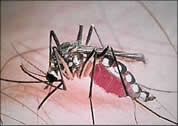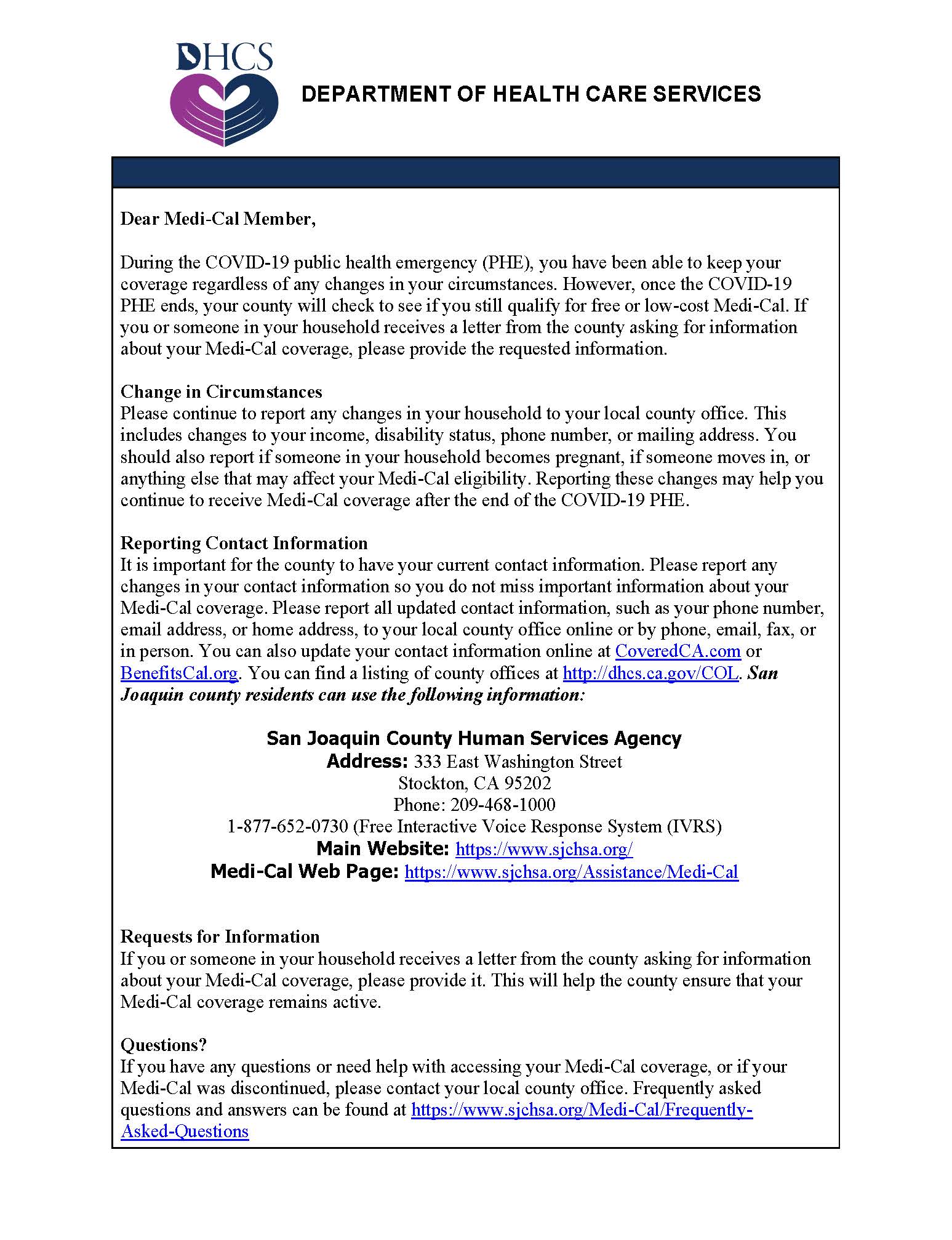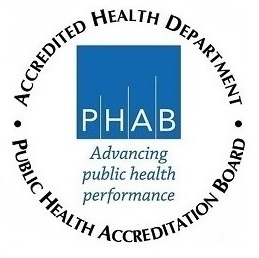West Nile Virus
Definition
West Nile virus is transmitted by mosquito's and causes an illness that ranges from mild to severe. Mild, flu-like illness is often called West Nile fever. More severe forms of disease, which can be life-threatening, may be called West Nile encephalitis or West Nile meningitis, depending on where it spreads.
Causes, incidence, and risk factors
West Nile virus is a type of organism called a flavivirus and is similar to many other mosquito-borne viruses, including Japanese encephalitis (which is found in Asia). Researchers believe the virus is spread when a mosquito bites an infected bird and then bites a person.
West Nile virus was first identified in 1937 in the West Nile region of Uganda, in eastern Africa. It was first identified in the US in the summer of 1999 in the Queens borough of New York, NY. It caused 62 cases of encephalitis and 7 deaths that summer. Since 1999 the virus has spread throughout the continental US and as of July 2004 has been identified in 46 states.
Mosquito's carry the highest amounts of virus in the early fall, thus there is a peak of disease in late August-early September. The risk of disease then decreases as the weather becomes colder and mosquito's die off.
Although many people are bitten by mosquito's that carry West Nile virus, most do not know they've been exposed. Few people develop severe disease or even notice any symptoms at all.
Data from the outbreak in Queens suggests that although 2.6% of the population was infected, only 1 in 5 infected people developed mild illness, and only 1 in 150 infected people developed brain inflammation (meningitis or encephalitis).
Risk factors for developing a worse form of the disease likely include the following:
- Conditions that suppress the immune system
- recent chemotherapy
- recent organ transplantation
- HIV
- Pregnancy
- Older age
West Nile virus may also be spread through blood transfusions and organ transplantation. It is possible for an infected mother to transmit the virus to her child via breast milk.
Symptoms
Mild disease, generally called West Nile, has some or all of the following symptoms:
- Fever
- Headache
- Back pain
- Muscle aches
- Lack of appetite
- Sore throat
- Nausea
- Vomiting
- Abdominal pain
- Diarrhea
These symptoms usually last for 3 to 6 days.
With more severe disease, the following symptoms can also be seen and require prompt attention:
- Muscle weakness
- Stiff neck
- Confusion or change in clarity of thinking
- Loss of consciousness
Signs and tests
Signs of West Nile virus infection are similar to those of other viral infections. There is nothing that can be found on physical examination to diagnose West Nile virus infection.
A rash is present in 20-50% of patients. True muscle weakness in the presence of other related symptoms is suggestive of West Nile virus infection.
Diagnostic tests that may be used if West Nile virus is suspected include the following:
- CBC -- may show a normal or elevated white blood cell (WBC) count
- Lumbar puncture and cerebrospinal
fluid (CSF) testing
- usually shows elevated WBC count (especially lymphocytes)
- usually shows elevated protein level
- Head CT scan -- often normal
- Head MRI scan -- may show evidence of inflammation (in about one-third of patients)
The most accurate way to diagnose this infection is serology, a test to detect the presence of antibodies against West Nile virus in CSF or serum (a blood component). This is considered the gold standard for diagnosis.
Rarely, a sample of blood or CSF may be sent to a lab to be cultured to evaluate the presence of West Nile virus. The virus can also be identified in body fluids using a technique called polymerase chain reaction (PCR). However, these methods can provide false negative results.
Treatment
Because this illness is not caused by bacteria, antibiotics do not help treat West Nile virus infection. Standard hospital care may help decrease the risk of complications in severe illness. There is no human vaccine available at present, and it is likely there will not be one for several years.
Research trials are under way to determine whether ribavirin, an antiviral drug used to treat hepatitis C, may be helpful.
Expectations (prognosis)
In general, the likely outcome of a mild West Nile virus infection is excellent.
For patients with severe cases of West Nile virus infection, the outlook is more guarded. West Nile encephalitis or meningitis has the potential to lead to brain damage and death. Approximately 10% of patients with brain inflammation do not survive.
Complications
Complications from mild West Nile virus infection are extremely rare.
Complications from severe West Nile virus infection include permanent brain damage or muscle weakness (sometimes similar to polio), and death.
Calling your health care provider
Call your health care provider if you have any of the symptoms of West Nile virus infection, particularly if you may have had contact with mosquitoes. If you are severely ill, seek attention in an emergency room.
If you have been bitten by an infected mosquito, there is no treatment to avoid development of West Nile virus infection. People in good general health generally do not develop a serious illness even if bitten by an infected mosquito.
Prevention
Experts refer to the “four Ds” as the most effective ways to prevent West Nile virus:
- DRAIN – Eliminate all sources of standing water on your property, including flower pots, old tires, rain gutters and bird baths. If you have a pond, use mosquitofish or commercially available products to eliminate mosquito larvae. Neglected swimming pools are also prime habitat for mosquito development. The San Joaquin County Mosquito and Vector Control District continues to take action to reduce mosquito populations in the area and is available to help with neglected pools and the prevention of mosquito development. To request District service, call 209-982-4675, 1-800-300-4675 or visit the District website at www.sjmosquito.org
- DEET – Apply insect repellent containing DEET, picaradin, oil of lemon eucalyptus or IR 3535 according to label instructions. Apply repellent only to exposed skin and/or clothing. DEET can be used safely on infants and children two months of age and older (http://www.cdc.gov/ncidod/dvbid/westnile/repellentupdates.htm).
- DAWN AND DUSK – Mosquitoes that carry WNV tend to bite in the early morning and evening hours, so it is important to wear repellent when outdoors. Make sure that your doors and windows have tight-fitting screens to keep out mosquitoes. Repair or replace screens with tears or holes.
- DRESS – Wear clothing that reduces the risk of skin exposure (i.e., long pants and long-sleeved shirts).
Additional Resources:
For more information about West Nile virus, visit the following websites:
San Joaquin County Mosquito and Vector Control District
California West Nile virus website
California Department of Public Health (CDPH) West Nile virus page
Centers for Disease Control & Prevention (CDC) West Nile virus page
Downloadabe Documents:
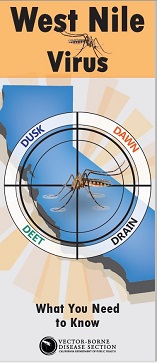 |
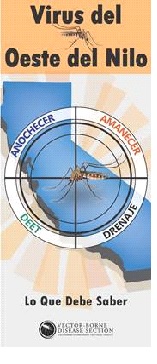 |
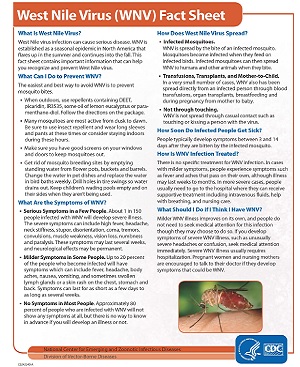 |
| West Nile Virus - What you need to know (English/PDF) | Virus Del Oeste del Nilo – Lo Que Debe Saber (Español PDF) | West Nile virus (WNV) Fact Sheet (English/PDF) |
